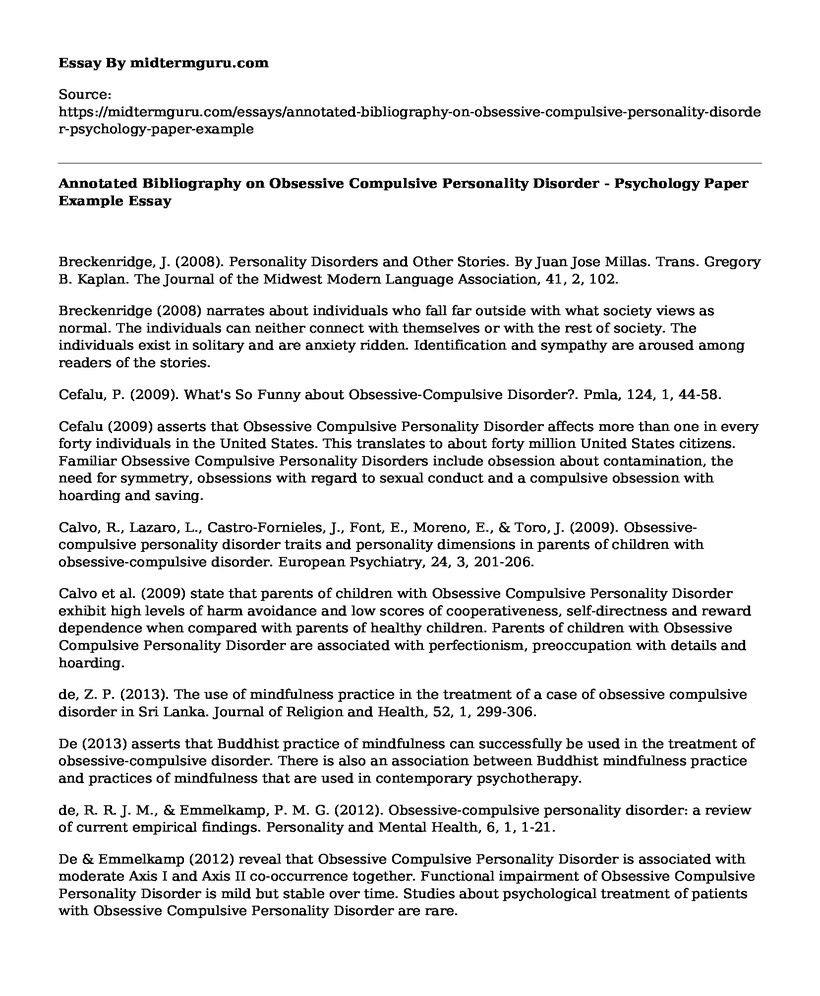Breckenridge, J. (2008). Personality Disorders and Other Stories. By Juan Jose Millas. Trans. Gregory B. Kaplan. The Journal of the Midwest Modern Language Association, 41, 2, 102.
Breckenridge (2008) narrates about individuals who fall far outside with what society views as normal. The individuals can neither connect with themselves or with the rest of society. The individuals exist in solitary and are anxiety ridden. Identification and sympathy are aroused among readers of the stories.
Cefalu, P. (2009). What's So Funny about Obsessive-Compulsive Disorder?. Pmla, 124, 1, 44-58.
Cefalu (2009) asserts that Obsessive Compulsive Personality Disorder affects more than one in every forty individuals in the United States. This translates to about forty million United States citizens. Familiar Obsessive Compulsive Personality Disorders include obsession about contamination, the need for symmetry, obsessions with regard to sexual conduct and a compulsive obsession with hoarding and saving.
Calvo, R., Lazaro, L., Castro-Fornieles, J., Font, E., Moreno, E., & Toro, J. (2009). Obsessive-compulsive personality disorder traits and personality dimensions in parents of children with obsessive-compulsive disorder. European Psychiatry, 24, 3, 201-206.
Calvo et al. (2009) state that parents of children with Obsessive Compulsive Personality Disorder exhibit high levels of harm avoidance and low scores of cooperativeness, self-directness and reward dependence when compared with parents of healthy children. Parents of children with Obsessive Compulsive Personality Disorder are associated with perfectionism, preoccupation with details and hoarding.
de, Z. P. (2013). The use of mindfulness practice in the treatment of a case of obsessive compulsive disorder in Sri Lanka. Journal of Religion and Health, 52, 1, 299-306.
De (2013) asserts that Buddhist practice of mindfulness can successfully be used in the treatment of obsessive-compulsive disorder. There is also an association between Buddhist mindfulness practice and practices of mindfulness that are used in contemporary psychotherapy.
de, R. R. J. M., & Emmelkamp, P. M. G. (2012). Obsessive-compulsive personality disorder: a review of current empirical findings. Personality and Mental Health, 6, 1, 1-21.
De & Emmelkamp (2012) reveal that Obsessive Compulsive Personality Disorder is associated with moderate Axis I and Axis II co-occurrence together. Functional impairment of Obsessive Compulsive Personality Disorder is mild but stable over time. Studies about psychological treatment of patients with Obsessive Compulsive Personality Disorder are rare.
Pinto, A., Liebowitz, M. R., Foa, E. B., & Simpson, H. B. (2011). Obsessive compulsive personality disorder as a predictor of exposure and ritual prevention outcome for obsessive compulsive disorder. Behaviour Research and Therapy, 49, 8, 453-458.
Pinto et al. (2011) state that Obsessive Compulsive Personality Disorder is a predictor of exposure and ritual prevention for Obsessive Compulsive Disorder. Diagnosis of Obsessive-Compulsive Personality Disorder and greater Obsessive Compulsive Personality Disorder severity predict worse exposure and ritual prevention outcome. Perfectionism is the criterion for Obsessive Compulsive Personality Disorder that is strongly associated with poor exposure and ritual prevention outcome. There is a likelihood that incorporating treatments that target Obsessive Compulsive Personality Disorder into exposure and ritual prevention may improve Obsessive Compulsive Disorder outcome.
Samuel, D. B., & Widiger, T. A. (2011). Conscientiousness and obsessive-compulsive personality disorder. Personality Disorders: Theory, Research, and Treatment, 2, 3, 161-174.
According to Samuel & Widiger (2011), measures of conscientiousness-related personality traits with each other thus support an assessment of each common trait. Measures of conscientiousness correlate highly with scales used in assessing specific components of Obsessive Compulsive Personality Disorder. However, variable measures exist with measures of DSM-IV OCPD. Differences exist within conscientiousness instruments that are used to assess general personality functioning within Obsessive Compulsive Personality Disorder. Therefore, Obsessive Compulsive Personality Disorder does not represent a maladaptive variant within normal range conscientiousness.
Sanislow, C. A., Ansell, E. B., Grilo, C. M., McGlashan, T. H., Little, T. D., Daversa, M., Gunderson, J. G., ... Morey, L. C. (2009). Ten-Year Stability and Latent Structure of the DSM-IV Schizotypal, Borderline, Avoidant, and Obsessive-Compulsive Personality Disorders. Journal of Abnormal Psychology, 118, 3, 507-519.
Sanislow et al. (2009) state that Obsessive Compulsive Personality Disorder is correlated with schizotypal, and borderline Personality Disorder than it is with Avoidant Personality Disorder.
Cite this page
Annotated Bibliography on Obsessive Compulsive Personality Disorder - Psychology Paper Example. (2021, Jun 11). Retrieved from https://midtermguru.com/essays/annotated-bibliography-on-obsessive-compulsive-personality-disorder-psychology-paper-example
If you are the original author of this essay and no longer wish to have it published on the midtermguru.com website, please click below to request its removal:
- The Significance of Psychological Trauma in the Yellow Wallpaper and the Boat - Paper Example
- Letter to Time Magazine Regarding the Choice for the Person of the Decade - Paper Example
- Paper Example on Gender Differences in Statistical Anxiety Among South Australian Undergraduate Students
- Quality Improvement Initiative in Mental Health Unit
- Critical Essay on The Global Grapevine: Why Rumors of Terrorism, Immigration, and Trade Matter
- Impact of Personality on Consumer Behavior - Research Paper
- Jose Depression - Case Study







